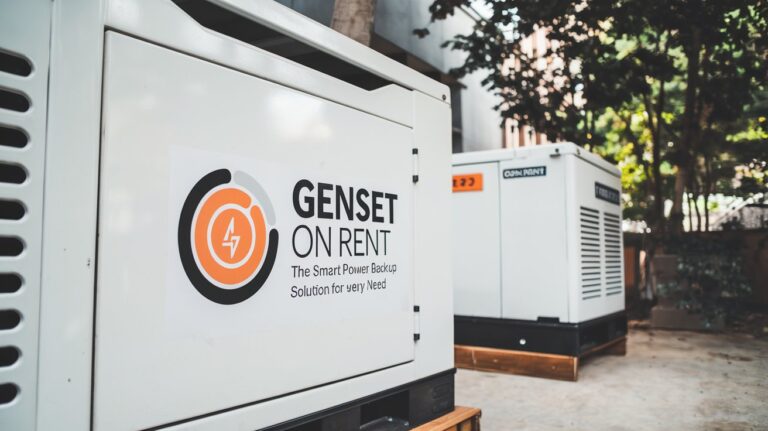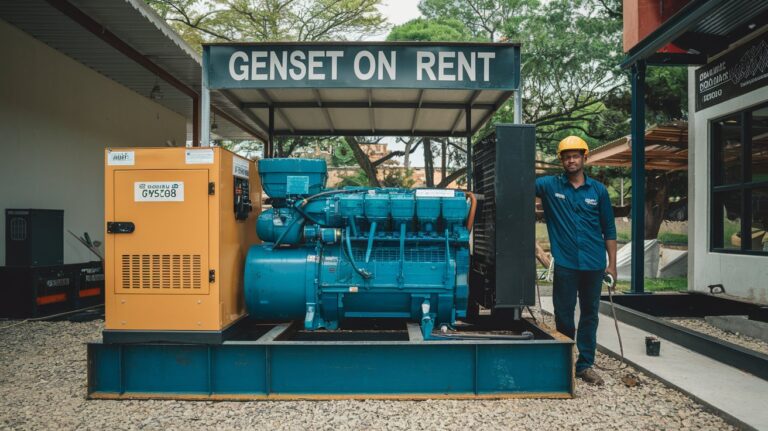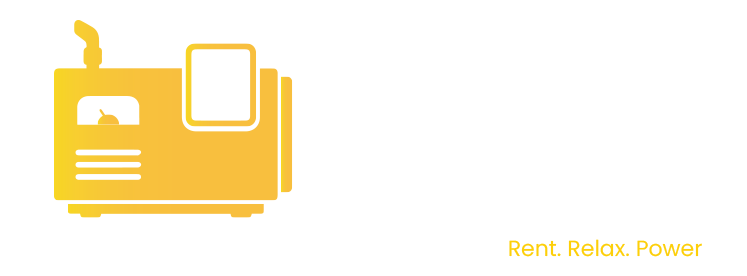Power outages are more than just an inconvenience—they’re a threat to productivity, safety, and peace of mind. Whether you’re a construction manager racing against deadlines, an event planner orchestrating a flawless wedding, or a healthcare provider safeguarding lives, unreliable power isn’t an option. This is where genset rentals shine. Not only do they offer a lifeline during emergencies, but they also provide unmatched flexibility for businesses of all sizes.
In this comprehensive guide, we’ll dive deep into why renting a generator is the smartest power backup decision you’ll make, explore industries that thrive on rental gensets, and walk you through choosing the perfect unit for your needs. Let’s get started!

Why Rent a Genset? 7 Compelling Reasons to Skip Ownership
-
Cost Savings That Add Up
Purchasing a generator requires a massive upfront investment—think tens of thousands of dollars for industrial-grade models. Add maintenance, fuel storage, and repairs, and ownership becomes a financial burden. Renting, on the other hand, lets you pay only for the power you need, when you need it. No depreciation worries, no hidden costs. -
Zero Maintenance Headaches
Generators aren’t “set and forget” machines. They demand regular oil changes, filter replacements, and fuel stabilizers. Rental companies handle all of this. Their gensets arrive serviced, fueled, and ready to work. If something breaks? They fix it—no extra charges. -
Flexibility to Match Your Workflow
Power needs fluctuate. A construction site might start with a small genset for initial groundwork but require a 500kVA beast for heavy machinery later. With rentals, scaling up or down is as easy as a phone call. -
Emergency Readiness 24/7
Disasters and grid failures don’t announce themselves. Rental providers offer rapid deployment, often within hours. Imagine a hospital keeping life-support systems running or a data center avoiding a $9,000-per-minute downtime cost—all thanks to a pre-negotiated rental agreement. -
Eco-Friendly Compliance
Modern rental gensets adhere to strict emission standards (like EPA Tier 4 or Euro Stage V). This means cleaner energy without the guilt, perfect for eco-conscious projects or urban areas with noise and pollution regulations. -
Test Before You Invest
Unsure about which generator suits your long-term needs? Rentals let you “try before you buy.” Test different models, fuel types, and capacities to find your perfect fit. -
Free Up Capital for Core Business
Why tie up funds in equipment that sits idle 90% of the time? Redirect that capital to marketing, hiring, or R&D while relying on rentals for backup power.
Industries That Can’t Afford to Skip Genset Rentals
Let’s explore how diverse sectors leverage rental generators to stay operational, competitive, and safe:
1. Construction & Infrastructure
Construction sites are often off-grid or plagued by unstable local power. Delays cost money—a single day of downtime can set back large projects by thousands. Rental gensets power everything from cranes and welding tools to site lighting and worker facilities. Bonus: Mobile generators can be relocated as the project progresses.
2. Healthcare & Hospitals
Power outages in hospitals aren’t just disruptive—they’re deadly. Ventilators, MRI machines, and vaccine storage demand 24/7 electricity. Rental gensets with automatic transfer switches (ATS) kick in within seconds of a blackout, ensuring continuity of care.
3. Entertainment & Events
From Coachella to corporate galas, events live and die by reliable power. A silent stage or a dark wedding reception is a PR nightmare. Rental gensets provide silent, clean energy for stages, food stalls, HVAC systems, and LED displays. Pro tip: Hybrid solar-diesel gensets are trending for sustainable festivals.
4. Manufacturing & Warehousing
A factory losing power mid-shift risks ruined materials, missed orders, and idle labor. Rental gensets bridge gaps during grid failures or planned utility maintenance. Some factories even use them for “peak shaving” to avoid high energy tariffs during demand spikes.
5. Agriculture & Farming
Modern farming relies on electric irrigation systems, cold storage, and automated equipment. A drought-stricken farm can’t afford a pump failure. Rugged, weatherproof gensets keep harvests and livestock safe.
6. Telecom & Data Centers
A 2023 study found that 95% of data center outages cost over $100,000. Rental gensets with dual-fuel capabilities ensure servers stay online, protecting everything from cloud storage to stock trades. Telecom towers in remote areas also depend on gensets to maintain signal during storms.
7. Retail & Hospitality
Picture a packed hotel during a storm: guests demand working elevators, kitchens, and Wi-Fi. Rental gensets prevent revenue loss and reputational damage by keeping amenities running smoothly.
How to Choose the Right Rental Genset: A Step-by-Step Checklist
Don’t just rent the first generator you find. Follow this guide to optimize performance and cost:
Step 1: Calculate Your Power Needs
-
List every device, machine, and system requiring backup.
-
Check their wattage (e.g., a 10kW AC unit vs. a 5kW industrial saw).
-
Add a 20-30% buffer for startup surges (motors often need 3x their rated power to start).
-
Unsure? Most rental companies offer free load audits.
Step 2: Fuel Type Matters
-
Diesel Gensets: Durable, fuel-efficient, and ideal for heavy-duty, long-term use. Perfect for construction and industries.
-
Natural Gas Gensets: Quieter, cleaner, and better for urban areas or indoor events. Requires a gas line.
-
Bi-Fuel Gensets: Combine diesel and gas for flexibility during fuel shortages.
Step 3: Mobility vs. Stationary
-
Towable/Portable Gensets: Mounted on trailers for easy relocation. Great for events and shifting worksites.
-
Skid-Mounted Gensets: Fixed installations for factories or hospitals. Often include soundproof enclosures.
Step 4: Duration & Rental Terms
-
Short-term (Days/weeks): Ideal for concerts, weddings, or minor outages.
-
Long-term (Months/years): Cost-effective rates for extended projects. Some providers include free maintenance.
Step 5: Check the Spec Sheet
-
Phase Type: Single-phase for small offices, three-phase for industrial equipment.
-
Noise Levels: Look for “super silent” models (60-70 dB) for residential areas.
-
Fuel Efficiency: Calculate runtime per tank to avoid frequent refueling.
Step 6: Vet the Rental Provider
-
Do they offer 24/7 emergency support?
-
Are their gensets well-maintained and modern?
-
Read reviews for reliability and transparency.

The Hidden Costs of Power Outages (And How Rentals Save You)
Still on the fence? Consider these eye-opening stats:
-
The average cost of a data center outage in 2023: $9,000 per minute.
-
A 1-hour blackout at a car manufacturing plant: $1.3 million lost.
-
70% of businesses hit by prolonged outages close within a year.
Renting a genset isn’t an expense—it’s insurance. For less than the price of a daily coffee per kW, you safeguard revenue, reputation, and reliability.
Conclusion: Power On, No Matter What
In a world where downtime is the enemy of progress, genset rentals are the ultimate ally. They eliminate the risks of ownership, adapt to your evolving needs, and ensure your business never skips a beat—whether you’re battling a hurricane, hosting a superstar, or saving lives.
